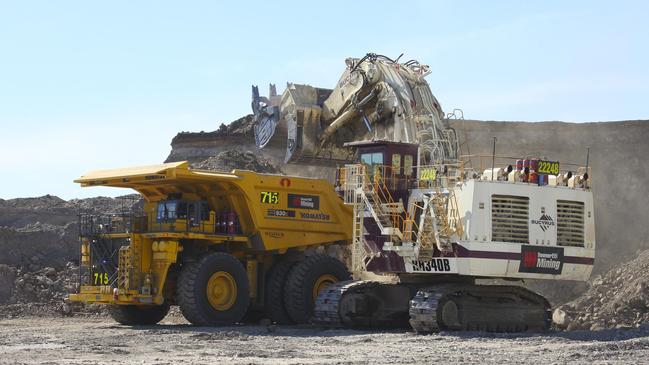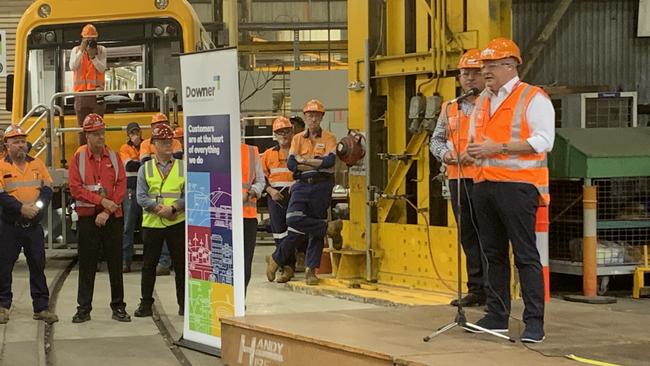Downer EDI plunges to April 2020 low and cuts guidance on accounting faults
The engineering group will launch an investigation to see if fraudulent activity was involved after historical accounting irregularities sees its profit guidance cut by $60m.

Investors have dumped engineering group Downer EDI after it shocked the market by revealing historical accounting irregularities and slashing its annual profit guidance by up to $60m.
Shares in Downer EDI plummeted more than 25 per cent on the news, to their lowest level since April 2020. About $660m was wiped from the group’s market value as shares closed down by 20.4 per cent to $3.82.
Downer said it had identified ongoing misreporting of revenue and work in progress for a $170m contract with a power company struck in July 2019, which resulted in an earnings overstatement of up to $40m.
Chief executive Grant Fenn — who last week announced he would leave the company in February — said Downer had recognised revenue for tens of thousands of separate jobs related to the contract before it had been earned and costs had occurred.
“We’ve found that revenue recognition was ahead of where it should be, which overstated the profitability in each period since it began and hid that the contract had been a loss,” Mr Fenn said.
He became aware of the problem on Monday evening, after a number of staff changes related to the project in recent months helped bring it to light.
“Based on information currently available the irregularities are estimated to result in a historical overstatement of pre-tax earnings in the order of $30m-$40m at the end of November 2022 accumulated across financial years 2020, 2021, 2022 and 2023,” he said.
“Any potential ongoing impact on earnings is still being determined.”
Downer has not ruled out fraudulent activity, saying a comprehensive review it hoped to be completed before its half-year results in February would uncover how the oversight occurred.
“We religiously review work-in progress level in the business and in this case, the circumstances around the very significant number of work orders has presented the ability for it to be opaque,” Mr Fenn said.
“What is clear now is that those reviews had not focused in on the point of revenue recognition of the tens of thousands of work orders involved in this contract.”

“It is still early days for us to definite on what happened. Whether it was mismanagement of the contract and if that meets the definition of fraud will be something we’ll look at.”
He did not believe accounting irregularities were present in any other contracts Downer held and said it expected to be able to return this particular contract to profitability.
But the engineering group slashed its profit guidance for the 2023 financial year by up to $60.3m on the back of the discovery.
In August, Downer had said it expected 10-20 per cent growth in underlying profit for the current financial year — assuming no material Covid-19, weather, labour shortages or other disruptions.
That would have represented an upswing of up to $45m, to $270.3m, from the $225.3m booked in the 2022 financial year.
“After analysis of the group’s trading for October and November, it has become clear that the guidance is now unlikely to be met,” Mr Fenn said.
“We’ve got to the point where the task ahead in the seven months left of the financial year is too great and unlikely to be achieved.”
Excluding any prior period impact of the accounting irregularities, Downer expects underlying profit of between $210m to $230m for the 2023 financial year, assuming no further material Covid-19, weather, labour shortages or other disruptions, Mr Fenn said.
The discovery of accounting irregularities is the latest in a series of misfortunes for Downer EDI, which has seen more than $1bn wiped from its market capitalisation in the past month. On Thursday afternoon the group’s market value was just above $2.5bn — down 27 per cent, or $915m — from a November 30 high of $3.45bn.
In November, Downer was issued a first strike after more than 56 per cent of shareholders voted against the remuneration report at its annual meeting, which came after it reported a 14 per cent fall in net profit for the previous financial year to $225.3m.
Last week, Mr Fenn announced that he would retire from the company after 12 years as CEO and would be replaced by chief operating officer Peter Tompkins.





To join the conversation, please log in. Don't have an account? Register
Join the conversation, you are commenting as Logout